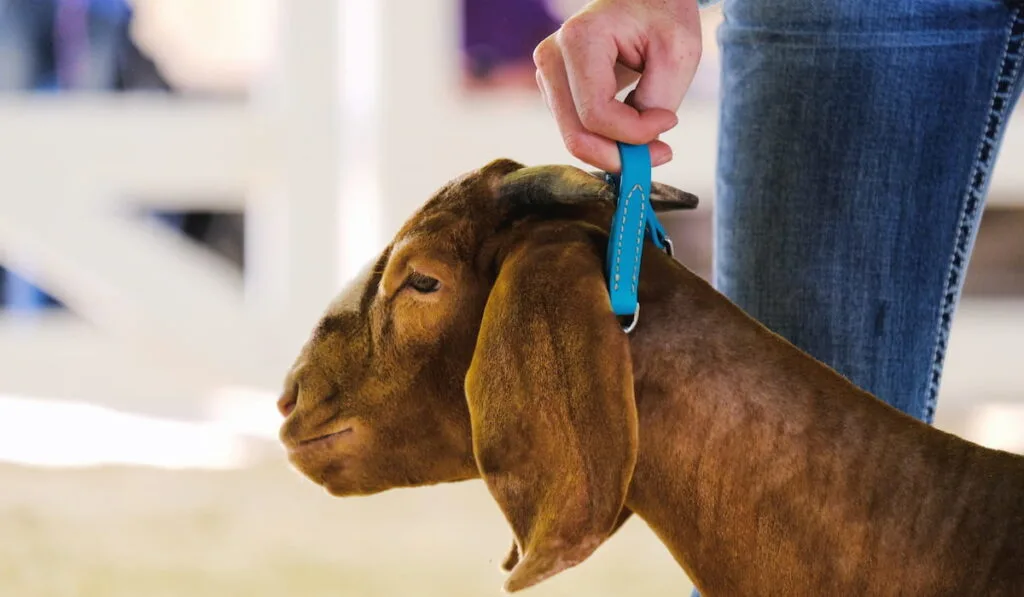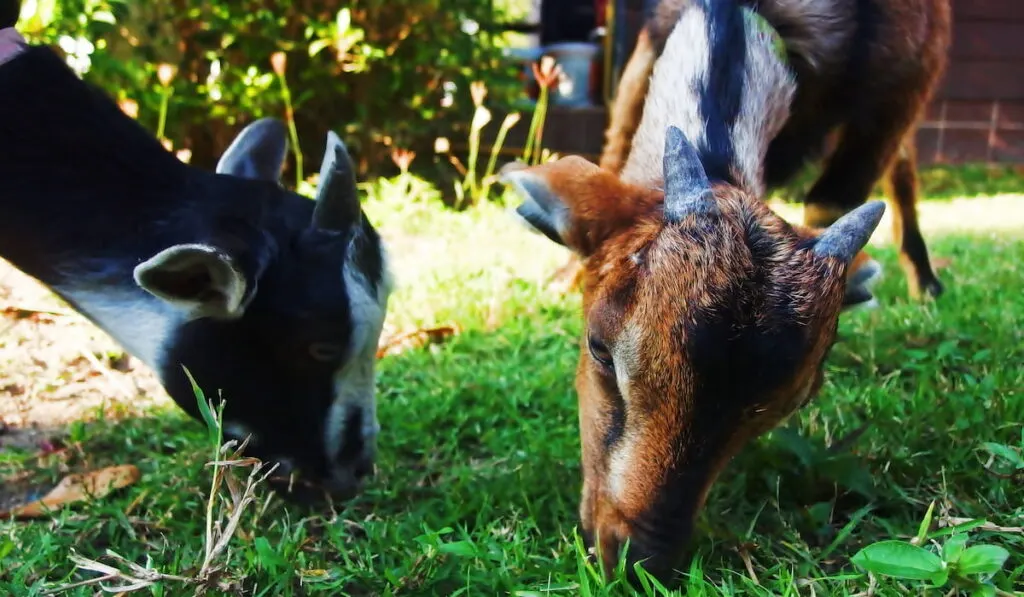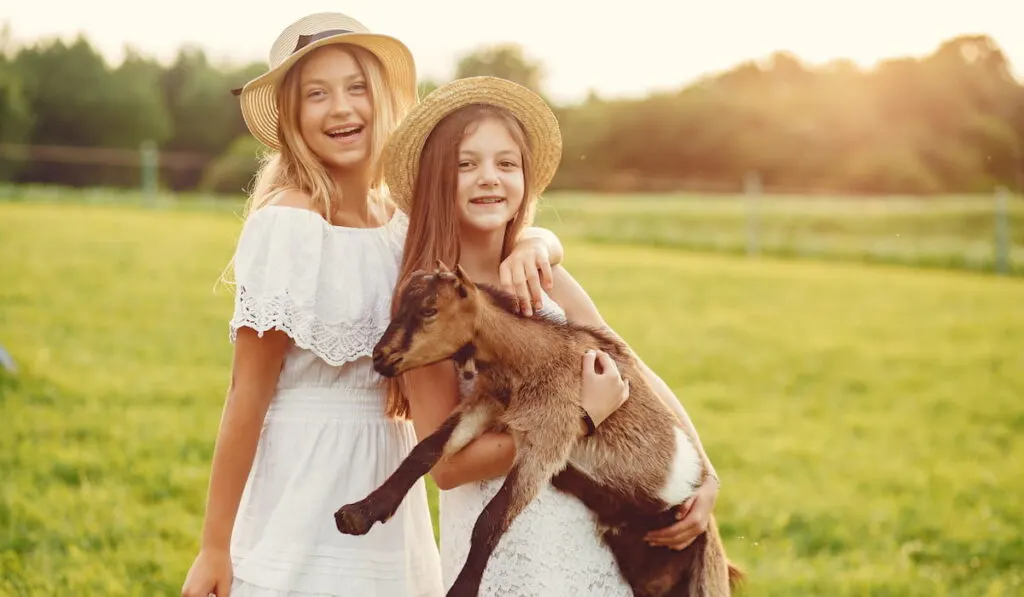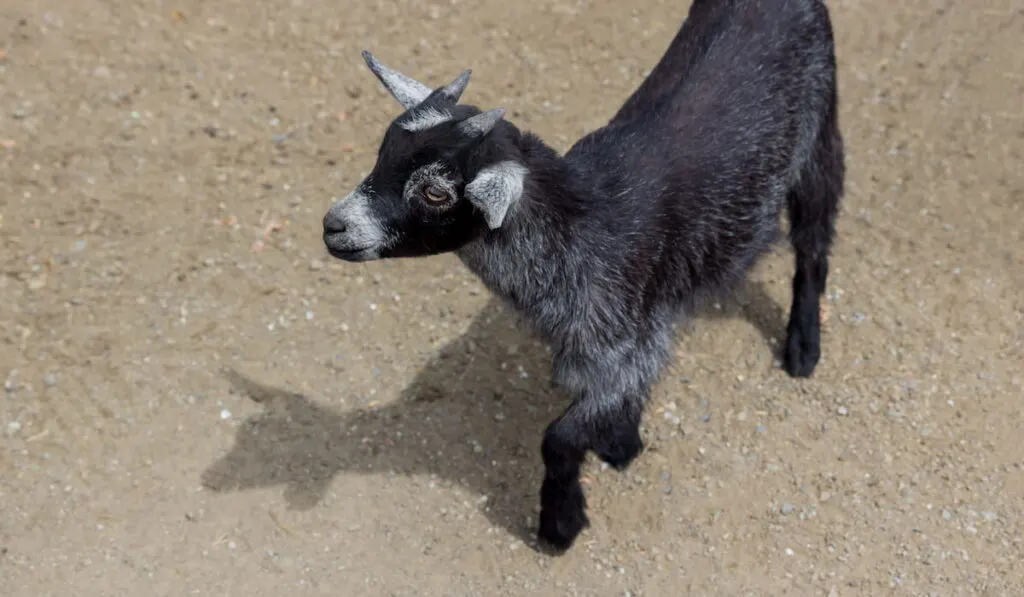Everyone should have a pet. Pets are not just fun to see, they offer emotional support and make you happier. Examples of popular pets are dogs, cats, hamsters, fish, and more.
Do goats make good pets? If so, how can you house train your goat to be a good pet?
How can you house train a goat? You can do so by giving it everything it needs, make it feel safe, not scare it away, and most of all, continue teaching it what you want it to do.
What should you consider before keeping goats as house pets? Can you keep your pet goat as well as other animal pets (cats and dogs) in the same house? Read on to find out!

Training Goats As House Pets
Goats are smart animals. Depending on the breed, they can be cute and sweet to cuddle. Before keeping goats as pets, however, there are some things that you should know.
What You Should Know About Keeping Goats as Pets
Consider the following before keeping goats as pets:
1. Goat Diet
Goats are strictly herbivores. As herbivores, goats eat only plants and plant products. Goats are also ruminants. As ruminants, they have a four-chambered stomach which includes a rumen.
The rumen is where microbes help to digest some food items for the goat. Because of the bacteria in the rumen, goats and other ruminants can digest cellulose.
How do feeding behavior and nutrition affect keeping goats as pets? Well, it does because other pets (especially dogs and cats) are either carnivores (meat-eaters) or omnivores (meat or plant eaters).
This means that your goats cannot eat the processed feeds of other non-herbivore pets. Also, other non-ruminant pets cannot eat goat feed because of the high amount of fiber they cannot digest.
2. Breed and Size of Goat
Some goat breeds can grow large and are not suitable to be kept as indoor pets. For example, the Boer goat breed, though very friendly and can be left with children, can grow too large to be kept as an indoor pet.
Goats are active animals always browsing for food, so a small room may seem a bit too confined for large goat breeds. Goats suitable as indoor pets, therefore, should be small and friendly breeds.
Here is a list of recommended goat breeds that could be kept indoors:
- Nigerian Dwarf Goats: These are popular goats. They can be raised as pets. They are also useful in meat and milk production and in various forms of yoga exercises. The best thing about Nigerian dwarfs is that they are small, cute, and friendly.
- Pygmy Goats: This breed of goats is common in petting zoos and as companion animals. They can grow up to 21 inches tall.
- Nubian-Nigerian Goats: Nubians are large-sized goats, but a cross with Nigerian dwarfs produces offspring that are not so large and very suitable as indoor pets.
- Kinder Goats: Kinders are the offspring of Nigerian dwarfs and Pigmy goat breeds. This breed of goat is very calm and can be left with children.

Which goat breed will you keep as your indoor pet?
3. Local Laws and Regulations
Before buying your first pet goat, check whether local laws permit you to raise goats. Are pet goats allowed in your residence?
You need to answer this question before you get a pet goat. You should also find out the maximum number of goats you can raise at a time.
If you know a vet or a few people around you with pet goats, you should ask them about local regulations in keeping goats as pets.
Now that you know a few things to consider before keeping goats as pets, how do you train your goats to live comfortably indoors?
How to Train Pet Goats At Home
Here are recommended tips for you:
1. Reward Them with What They Love
For every animal, the best way to teach them is to reward them for every action gotten correctly. You should know the favorite treat or food of your goat. When you are training your goat to obey simple commands, give them treats when they do it correctly.
If your goat is losing interest, you should allow it to do something else before you continue.
Remember that you should only give it its favorite treat during training or on special occasions because if you feed your goat with it too regularly, it may not be too effective anymore.
2. Use Collars
Goats are easier to control when they have collars. Collared goats are also easily identifiable as pets.
When goats have collars on, they can be easily leashed, controlled, and restricted to a particular region for a time (maybe when you will not be around). You can also walk goats with collars.
3. Do Not Chase Your Goats
This is a vital tip. Goats fear people instinctively and run away when they do not feel safe. When training your goat, use the reward approach and never chase your goat.
If you chase your goat or make it feel unsafe around you, it will always run away, fail to learn anything, and might refuse your training (even with rewards).
Do not chase your goat.
4. Potty Training
Goats poop a lot. Even as kids, goats poop a lot. You should always clean your goat litter box so that your goat will not be exposed to any disease.
Also, cleaning your goat litter box twice daily is healthy, not just for your goat, but also for you and your family (remember that your goat is indoors).
5. Repeat and Keep Teaching Them
Even though you feel that your goat has learned everything you want it to learn, you should still go over everything occasionally to remind it of the training.
Remember that you need to make your goat feel safe all the time so that it will not run away from you and others in your home.

As you can see, it is not so difficult to train your house goat. To keep goat pets requires commitments and we will discuss them in this article.
Caring For Your Pet Goat
Here are ways to care for your pet goat:
1. Food and Water
Goats, like other animals, need food and water. As herbivores, goats eat plants and plant products. Here are examples of food for your goat:
- Vegetables
- Grass and plant leaves
- Fruits
- Grains and seeds
- Soft barks
- Goat pellets
Goats cannot eat the leaves of tomatoes and potatoes because of their toxicity, so you should research the safety of a plant before you feed your goat with it.
As indoor pets, your goats should eat more goat pellets because they have readily available balanced nutrients for your goats and you do not want to litter your home with leaves.
2. Milk for Goat Kids
Goat kids need milk from a mother goat for the first 2-3 weeks at least. Kids need their mother’s milk to get the necessary bacteria to help establish their rumen.
After the first few weeks, you can replace their mother’s milk with formula and cereals. After 4-5 weeks, you can introduce plants and plant products to their diet.
If you must separate a mother goat from her kids, ensure that you milk her occasionally to reduce the pain of her udder.
3. Allow Your Goat to Go Outside Sometimes
As browsers, goats need to explore. Also, you should allow your goat to go out to search for its favorite foods and even feel the cool wind of nature.
Since your goat is an indoor goat, you will need to supervise it whenever it is outside. Supervise your goats just as you supervise dogs that are out.

4. Get a Companion Pet
As you must know already, goats are social animals. This means that you should not keep just one goat.
If you need just one goat, you should have a dog or cat. Goats do not like being alone and they can get depressed when no one (not even you) is around.
5. Going to the Vet
Always schedule a meeting with the vet. Give your goat the necessary vaccinations. If you think that your goat is sick, call the vet and treat the goat immediately.
Related Questions and Answers
I know you have a few questions to ask. Here are some possible answers:
1. Do Indoor Goats Get Sick?
Yes. Goats can get sick. Here are some common goat diseases you should watch out for:
- Coccidiosis: This intestinal bacteria causes diarrhea in goats.
- Sore mouth: This viral disease causes blisters in the mouth of goats.
- Enterotoxemia: An imbalance of bacteria in the rumen of goats. It can be caused by the immediate change of your goat’s diet.
- Bladder stones: These are stones that form in your goat’s bladder and block urination. It is usually caused by unplanned feeding regimes.
- G-6-S: This genetic defect is common in Nubian goats. It causes Nubian goats to die at a young age.
If you think that your goat is sick, contact a vet.
2. Can Goats Share Diseases with Cats and Dogs?
Goats are mammals like cats and dogs, so they can share similar diseases that can cause fever, fatigue, etc. Most parasites (including bacteria, nematodes, protozoans, etc.) are host-specific.
This means that they prefer one host over others. Non-host-specific parasites, however, can be transmitted accidentally when an unsuspecting animal is exposed to a contaminated surface.
To prevent your pet from getting a disease from other pets, use the following tips:

- Isolate the Sick Animal: Isolating a sick animal can prevent the disease from reaching other animals in the house. It also makes you and your family safe.
- Clean Their Poop Regularly: Most parasites (especially intestinal nematodes) lay their eggs on the poop of your animal. To prevent other animals from getting the infection, always clean the poop.
- Vaccinate Your Animals: Vaccinating animals help them to become immune to some diseases they can get in the future.
Remember that the health of your family is important.
3. Will Your Cat or Dog Harm Your Pet Goat (Or Vice Versa)?
Unless you have a dog with temper issues, your goat is safe among your dogs and cats. Also, you should keep a calm goat breed as an indoor pet so that it does not headbutt other animals in the home.
4. Can You Drink Your Pet Goat’s Milk?
Well, goat milk is sweet and safe for consumption, but having a goat in-milk in the house could be messy.
Goats produce milk after childbirth, so your pet goat probably needs that milk to feed her kids. While you can still collect some milk for your consumption, note that you’d have to provide other sources of feed for your goat kids.
Goats will usually produce more milk when they are regularly milked, but unless you really have to, you do not need to milk your pet goat. If you are raising goats for milk production, you should raise dairy goat breeds.
5. Should You Keep Horned Goats As Pets?
Depends on what you want and if the local regulations permit it. Some people prefer goats with horns because of their looks, others do not.
Some areas do not allow people to keep goats with horns because of safety reasons, other areas permit it. You should know what you want and if it is allowed.
Have you gotten the answer to your question?
Final Thoughts
Goats are indeed cute and lovely animals and keeping one as an indoor pet is possible. It is fairly easy to raise goats as indoor pets. To raise goats successfully, remember to use all the tips mentioned in this article.
Sources
- https://www.thesprucepets.com/goats-as-pets-1236834
- https://www.thehappychickencoop.com/keeping-goats-as-pets/
- http://www.vetstreet.com/our-pet-experts/want-a-backyard-goat-10-things-to-consider?page=2
- https://simplelivingcountrygal.com/yes-can-train-goat
- https://www.dummies.com/home-garden/hobby-farming/raising-goats/how-to-teach-your-goats-to-behave/
